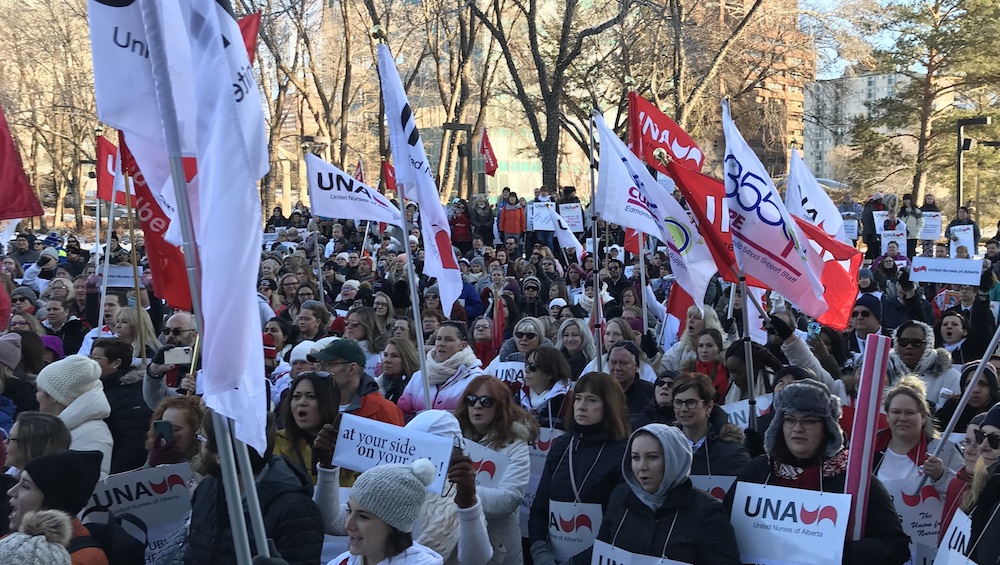Alberta union leaders have been summoned to a “labour relations consultation” next weekend in Edmonton at which they will be informed how Premier Jason Kenney’s government plans to “protect workers from being forced to fund political parties and causes.”
The announcement of the one-hour meetings came in an email from Deputy Labour Minister Shawn McLeod received by unions late Friday.
The email was not particularly informative, although it wasn’t hard for the elected union leaders who got it to figure out what’s really going on. The short notice and brief time scheduled do not suggest an interest in genuine consultation, the tone is likely to cause offence, and the timing during the United Conservative Party’s annual general meeting in Calgary was surely no coincidence. Labour Minister Jason Copping, accordingly, will presumably be otherwise occupied that day.
Union presidents were advised to pick three of several one-hour time slots between 8 a.m. and 5 p.m. for the swift “consultation.” Officials will let them know at which one they’ll be told how the government intends “to bring back balance to legislation.”
In the context of Alberta labour relations, the latter phrase is Orwellian. Since the creation of this province in 1905 there has never been true balance in labour relations in Alberta, although some modest reforms to labour law were passed by the NDP government in 2017.
The NDP billed its 2017 changes as bringing “Alberta’s workplaces into the 21st century,” an exaggeration as they really only brought them into the mid-20th century in terms of law already on the books in other provinces. The NDP revisions also ensured some legislation likely to be ruled unconstitutional was brought into accord with court decisions on the rights of Canadians to bargain collectively under the Canadian Charter of Rights and Freedoms’ guarantee of freedom of association.
By the sound of it, the UCP is determined to roll back Alberta labour law to the 1950s or before, ignoring the Canadian Constitution if necessary, to silence union opposition to the party’s agenda.
If Canadian charter rights stand in the way of that objective, the UCP seems prepared to bulldoze them.
Because unions are effective advocates for workers’ rights, public services and income equality, the Kenney government would very much like to make it illegal for them to speak up in opposition to its plans to hijack pension funds, underfund public health care and education, privatize public services, kill pharmacare, and downgrade workplace safety.
“Protecting” working people and their families from being “forced to fund political parties and causes” was the rhetorical sleight of hand used by the party in its successful election campaign, and is now repeated in the emails from Deputy Minister McLeod. A lawyer and former member of the Alberta Labour Relations Board, McLeod sought the UCP nomination in the Edmonton-Riverbend riding in 2018, although he withdrew from the contest before the vote.
Other UCP labour relations legislation includes the government’s effort to grab control of public sector pensions enabled by Bill 22, the Reform of Agencies, Boards and Commissions and Government Enterprises Act, which is now law; provisions in Bill 21, the Ensuring Fiscal Sustainability Act, not yet passed, that would allow the government to give public-sector employers compulsory “bargaining” mandates before, during and after collective bargaining; and the government’s vow to use legislation to roll back government employees’ wages.
The department’s hurry, while unexplained, is likely that it intends to introduce the legislation soon, possibly next week.
Needless to say, this will be a long fight with a government determined to radically change Alberta to serve as a bridgehead for the dystopian new Canada the Conservative movement is determined to impose on our country, despite sufficient opposition from citizens in most provinces to make its election difficult.
So it’s important for unions in other provinces to remember that this is their fight too, and their members’ fight.
The time is going to come soon that the Trudeau government will have to face up to the need to deal more aggressively with Kenney. After all, while workplace relations are a matter of provincial responsibility in the Canadian Constitution, the fundamental freedoms of all Canadians are not.
Surely that was starting to become evident to Deputy Prime Minister Chrystia Freeland after her meeting with Kenney in Edmonton produced a lengthening list of arrogant demands from the premier that the Liberals enact Conservative policies.
David Climenhaga, author of the Alberta Diary blog, is a journalist, author, journalism teacher, poet and trade union communicator who has worked in senior writing and editing positions at The Globe and Mail and the Calgary Herald. This post also appears on David Climenhaga’s blog, AlbertaPolitics.ca.
Image: David J. Climenhaga




